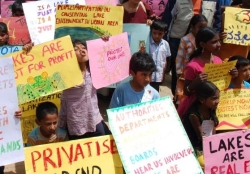The High Court of Karnataka puts brakes on lake privatisation
4 November 2008

Environment Support Group (ESG) had a very significant victory in its Public Interest Litigation (PIL) (PDF – 194 KB) against the privatisation of lakes on 04 Nov 2008. Passing an interim order (zip file – 164 KB), the High Court of Karnataka has restrained the Government and private parties from proceeding with any further investment or development of lakes based on the privatisation (PPP) model. The Court gave two weeks to the Government to file a comprehensive plan for the protection of lakes and gardens in a manner that would ensure everyone, especially the “have nots,” could enjoy the bounty of nature.
ESG advocate Mr. Sunil Dutt Yadav and Leo F. Saldanha, Coordinator of ESG (as party in person) argued the case as Petitioners. Heading the Division Bench of the High Court, Chief Justice P D Dinakaran invested a substantial amount of time at the Court in expressing his anguish over the privatisation of the commons. As the Judge remarked, “we cannot be mute spectators” when the common man has to “stare at a lake through a fence.” In fact this argument was extended as applicable to all lakes and forests. Many of his observations are worth noting as indicative of the mind of this Court on issues relating to the privatisation of commons.
View the interim order passed by the High Court on November 4th.
Observations of the Chief Justice leading the Division Bench while passing the interim order:
On the overall policy:
“Nothing but “exploitation and misuse of power. How can the Govt work like this?….. Govt is the guardian and Trustee. You created Lake Development Agency to conserve lakes, and they acted as an agency to trade them away.”
“Is nature to be preserved only for the haves? Bangalore has already become only IT city! Very unfortunate situation. Original residents of Bangalore city will be alienated from their right of enjoyment of nature.”
“If this country is meant only for haves, we cannot be mute spectators.”
The Chief Justice highlighted how this hurts the common man by using the analogy of an High Court employee taking his/her family to a lake on a visit. He explained that to get in, it would cost Rs. 100 (for a family of five at at least Rs. 20/head). Then for every service inside there would be a fee. At the end of the day, the employee would have spent at least a 1000 rupees, something s/he could not afford even once a year for a mere visit to a local neighbourhood lake.
Chief Justice berated this policy by saying “If this is permitted, a time will come when people have to pay to enter Cubbon Park and Lal Bagh” (Bangalore’s two principal parks). “Maybe even the High Court!”
“With all humility, concern and deep worries we are investing the precious time of this Court in this matter. Our deep concern is that one day or the other these places may not be accessible for the common man. This is 100% true! Poor man has to stand outside the fence and stare at a lake? Common man is deprived of the natural right to enjoy beauty of nature.”
On the Lakes ecology:
“This city is fortunate to have such ecological richness.”
“Once birds stop on their migratory route in one season, next season they may not come.”

